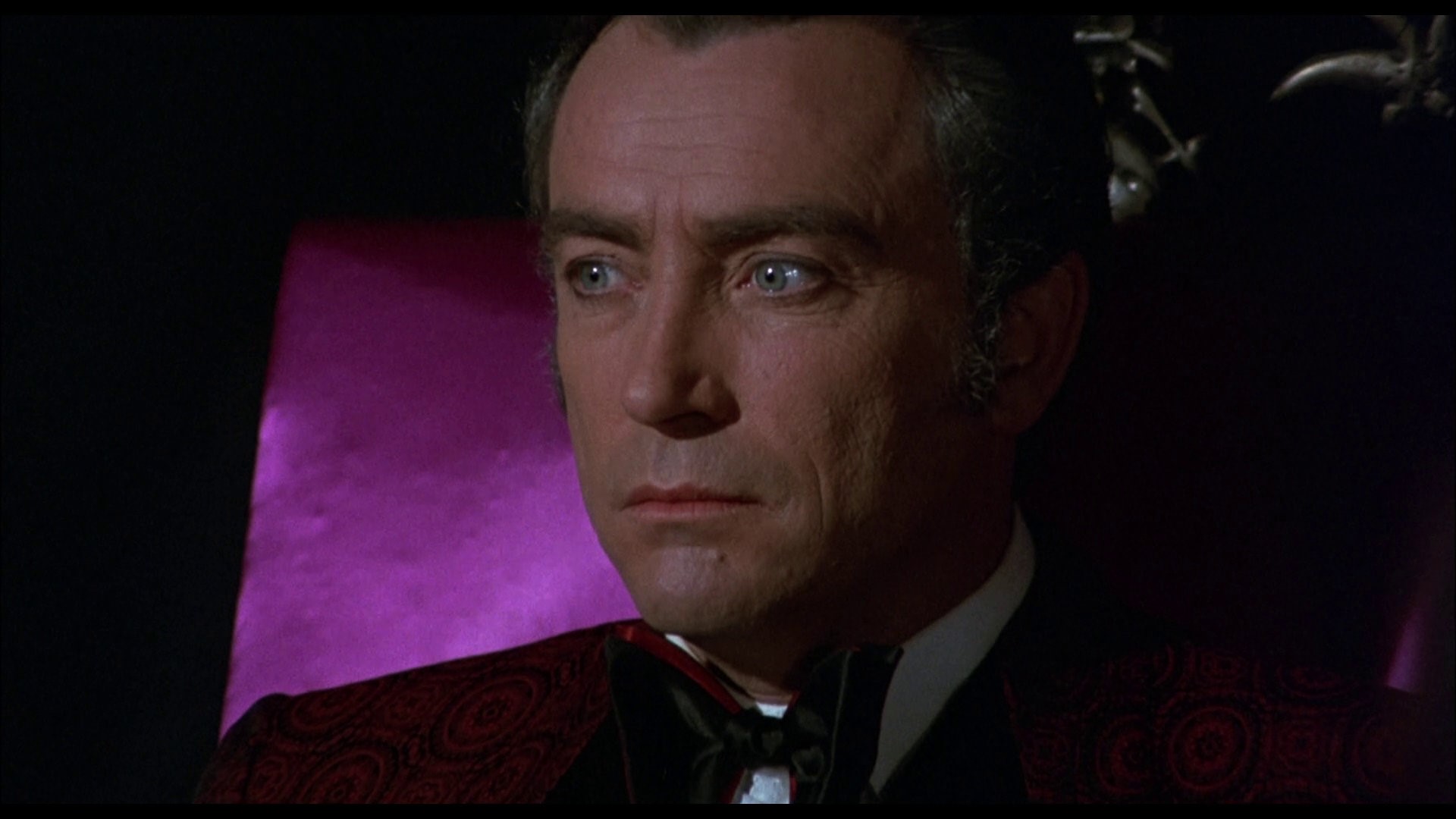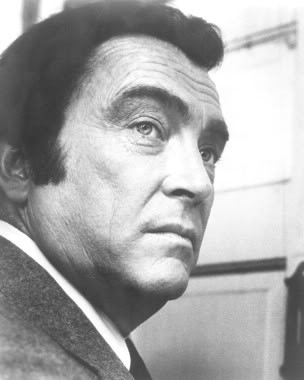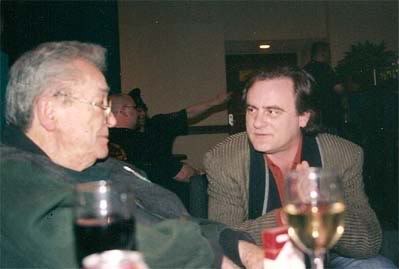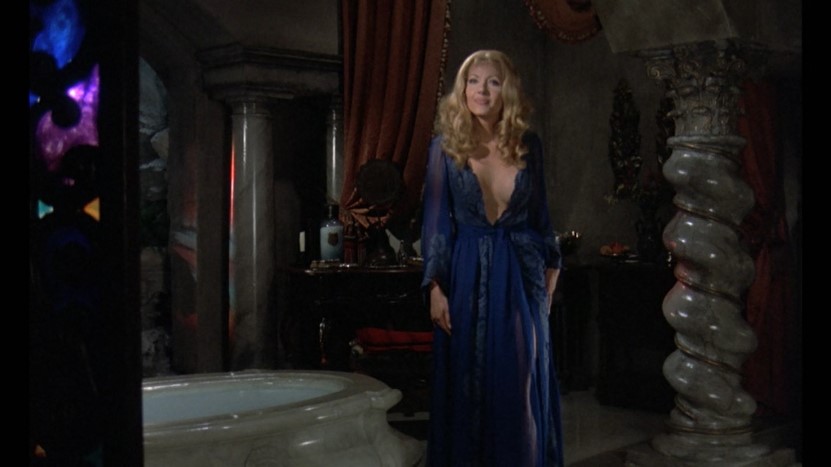
ROBERT QUARRY "THE RETURN OF COUNT YORGA" (1971)
I'm remembering my friend, actor Robert Quarry, on the anniversary of his birth, 3 November, 1925.
Bob was a strong actor, an exceptionally intelligent man, a brilliant storyteller, and a loving, true friend. He is best remembered by film fans as portraying “Count Yorga, Vampire” in a pair of low-budget shockers produced in the early 1970s.
Below is an essay I wrote about Bob when he was making a momentous life change: from living on his own in a little apartment to moving into an assisted living retirement home. I think that's partly what killed him. Sapped him of the will to live—the sudden change and lack of independence. What follows, however, written in 2008, was a celebration of Bob during that time of transition. I originally wrote and posted it on The Classic Horror Film Board during a “Robert Quarry Appreciation Week”, during which a group of us spear-headed a campaign to raise some money and donate some items to help Bob.
ROBERT QUARRY: A Celebration and a New Beginning (2008)
 The first time I met Robert Quarry, over a couple of whiskey and sodas in a hotel bar at a horror convention, I was struck by a man who, by turns, was garrulous, witty, friendly, and driven by a compulsion that some of us are unfortunately afflicted with in life---the compulsion to be an actor. Quarry was 77 years old.
The first time I met Robert Quarry, over a couple of whiskey and sodas in a hotel bar at a horror convention, I was struck by a man who, by turns, was garrulous, witty, friendly, and driven by a compulsion that some of us are unfortunately afflicted with in life---the compulsion to be an actor. Quarry was 77 years old.
Oh, I certainly knew Quarry's work, but I never thought to ask him the usual fan questions. You know the kind-"What was Vincent Price like when you made Dr. Phibes Rises Again?", "Did you trade cooking recipes?", or, "Is it true that Count Yorga Vampire was intended to be a porn film and you talked the director out of that?"-no, none of that. Mysteriously, we connected on another level altogether. The sort that, not to be rude to other company present, does tend to exclude others not of the fellowship. As if discovering a fellow member of a secret fraternity; you know, the way a couple of passionate auto mechanics bond, or horse enthusiasts, or, well, at the risk of being misunderstood here, let me just say that the last time someone connected with me that way, I fell deeply in love with her.
Perhaps I should clarify that above statement quickly.
Then, that night a few years ago, in a noisy, over-crowded hotel bar, were just two actors, two simple actors, consumed in discussion about the craft of their profession. The world disappeared for several hours as we traded stories, dreams and fears about our work, and not about the millions of mundane things that surround, and often over-shadow, that work.
Make no mistake, Robert is a brilliant raconteur. For a man who's career in film spans the end of Hollywood's Golden Era, though the anything-goes period of the 1960s and '70s, with solid work in live theatre, live (and canned) television, and radio, Robert has an endless supply of wonderful stories of the famous and infamous.But that night wasn't about humorous but superfluous gossip and rumor. It was about what drove each of us into this treacherous world called entertainment; it was about the need to act and to be storytellers of a specific kind.
And then there came a moment that night when Robert's eyes noticeably changed as he looked at me. It was unmistakable, but hard to explain. It's a look that both pulls back into a "wide shot" to take everything in, while at the same time bores penetratingly into your very soul.
Like I said, the last time someone looked at me like that, well…
Robert was about to ask me something…but he didn't. Eventually, exhausted from talk, we said goodnight and toddled off to our rooms.
He popped the question the next morning, while pouring coffee in the restaurant.
"I've been thinking about doing a play for sometime, I think I mentioned it last night, called ‘I Never Sang For My Father’", he said.
I told him I knew the Robert Anderson play, and knew the film from 1970 that starred Melvyn Douglas and Gene Hackman.
"Well, I've a connection to a small theatre in Pasadena that's interested, and I'd like you to play my son."
In that instant, I knew what doing the play, especially that play, meant to Robert. I'm not one to read too much into things, and hesitate even to this day as to the importance of the subject matter. But the play, on a simple level, is about a father and son who cannot communicate on any level and at the moment when they are able to, the father has died, and it is too late. In the film version, the son says in an opening line, "Death ends a life, but it doesn't end a relationship…"

Photo: ROBERT QUARRY AND MARK REDFIELD
For Robert, it had less to do with the plays themes and ideas of mortality (although they were a small factor), but more to do with the fact that, in the role of the father, was a big, emotional meaty part, and Robert wanted to act. He had not acted in some time. And for an actor not to act, not to create, well, it's a kind of death.
You see, in the early 1980s, Robert's life took a horrifying turn when he was mugged one night near his home. Ribs broken and knees shattered for just a few dollars, he spent years in rehabilitation and out of work, fighting just to stay alive, and has been plagued with health problems directly related to the attack ever since. Compound this with what the body does to us all naturally as we age and Robert found over the years that he wasn't wanted anymore as an actor, as it was difficult to be insured, let alone walk some days.
Even then, when things seemed hopeless and all was lost for Robert, friends came to his aid to help him and give what they could to let the actor that was Robert Quarry live. Director Fred Olen Ray was able to cast Robert in a string of films that, on its important practical level, allowed Robert to stay in the actor's union to navigate the gross expense of countless surgeries and rehabilitation. But more importantly, a friendship between Fred and Robert grew that has lasted to this day.
As I write this, Robert is now 83 years old. Frustratingly for Robert, for both of us, we never did do the play “I Never Sang For My Father”. Over the years that our friendship deepened, Robert's body continued to fight against everything his heart and mind desired. A series a small heart attacks, his legs continually giving him trouble, an endless list of drugs that he hates having to take to keep all his moving parts working---Robert remains a fighter and that same garrulous, witty, charming and open young man that I met several years ago.
Two years ago Robert began to realize that maybe he had better do something that most dread and fear, and that is to move himself into a retirement home. As he's gotten older, and found it more and more difficult to physically do the simple things, he made his decision and was lucky to get an opening at the Motion Picture Country Home in Woodland Hills.
For a man so fiercely independent, to uproot himself from a home he'd lived in for nearly forty years, was an emotionally and physically devastating experience. But he has handled the transition with his usual aplomb and humor. A most wrenching factor in this new ordeal was the fact that, because of very specific rules at the Country Home, Robert had to leave virtually all of his possessions behind him. His clothes, furniture, and many personal belongings.
No, we never did do “I Never Sang For My Father”, but I can sing for Robert Quarry, and in this week of celebration of and appreciation for an actor loved by many (May 4-May 11, 2008), I am overjoyed that once again family, friends, filmmakers and fans has risen to help in a time of need and have helped with the move itself and have been there as he's gotten settled into a new place. And here I should mention Tim Sullivan, who went beyond the call of duty. When it was learned that many of Roberts belongings could not come with him, Sullivan began a campaign to ask the fans to help, and he set up registries at Target and at Amazon. Because of his hard work, and the outpouring of support, Robert now has new furniture, new clothes, and a new beginning. And let me not forget what Robert's own nieces are doing to help, who wish to remain out of the public spotlight, but are very glad the fans have stepped up for Uncle Bob. My eternal thanks to all.
Robert has been overwhelmed, in a very good way, and indeed overjoyed by all of this attention. Slowly, he is coming to like the new place. It's clear that his quality of life has improved, his circle of friends has widened, and the old rascal may just be with us for a good long time to come. I hope so. He is my friend. We will be working together soon, because that is something that I can try give, beyond material things. Robert Quarry is still an actor, and a formidable one.
At the same time, Robert is strangely embarrassed by all the attention, but wants to hear from his fans. He doesn't want pity, or his friends to fight over him or for him, nor anything bad to happen because of ill-founded rumor and gossip that can so easily spiral out of control. Just the other day Robert and I were talking about the subject of rumor, and the Clint Eastwood film Unforgiven, and how a very real situation was portrayed worse and worse with each telling to whomever would listen. Robert said, regarding his own situation, "I want my friends to know that I am grateful for all they've done. But this other stuff, this talk. I don't want all that bullshit. Life's too short." And that's a direct quote.
Robert is once again looking forward, to the future.
And it looks brighter and a little more peaceful, to me.
-Mark Redfield
May 4, 2008
-------------------------
The above tribute was edited to bring it up-to-date, and remove expired information regarding addresses and emails set up to help Bob, on June 4th, 2008.
For many years I attempted to make a film based on Poe’s “The Tell-Tale Heart”, and it was to have starred my friends Ingrid Pitt and Robert Quarry.
It was a tremendous effort to raise the money. My adaptation is set during the early days after the end of the Civil War, and we would shoot on location on the American East Coast, but because of Robert’s failing health (making air travel impossible), we’d build his sets in Hollywood and shoot his scenes there. Great misfortune struck when my investor suffer a stroke, and his recovery became paramount and of course he had to pull out of the project. I scrambled and pressed on to find new money, when sadly, Robert Quarry died on February 20th, 2009, in Woodland Hills, in the home he had moved into.
I was devastated. Bob wanted more than anything to work, and again I was unable to give him that. The role of the “old man with the evil eye” in my version was a great, meaty part written especially for Bob’s talents. Accentuating his great mind and vocal phrasing, and diminishing his physical limitations. In the end, and to my sadness to this day, I failed in giving him the work.
For some time after Bob passed away, Ingrid Pitt and I tried to keep the project alive. I wanted it for her as much as I had wanted it for Bob. Sweet, fiery Ingrid would often phone me in the middle of the night with new suggestions of actor friends who might be right for the part. It was not to be, for any of us.
Ingrid herself passed away on November 23, 2010.

Photo: Ingrid Pitt in "Countess Dracula" (1971)
We never made “The Tell-Tale Heart”. The script, production notes, storyboards and designs are locked in a box.
I miss Bob and Ingrid very, very much.
Robert Quarry
(November 3, 1925 - February 20, 2009)
~ Mark Redfield
Baltimore
3 November 2015

